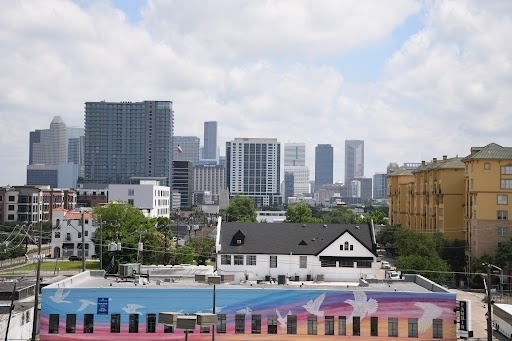“We beat [the 1981] record by over 25,000 jobs,” Jankowski said.
Jankowski delivered his remarks at a March 9 economic webinar presented by the GHP, the largest chamber of commerce in the area.
Jankowski estimated the region would pass the 3.1 million total jobs mark in 2022, which would still be short of pre-pandemic levels of over 3.2 million.
“We’re still short jobs ... we’ve got almost all of them back, but we’ve got a little bit left [to make up],” Jankowski said.
Restaurant job recovery
Restaurants and bars saw the strongest job recovery in 2021, with 19,500 new jobs, according to the Texas Workforce Commission and the GHP. Jankowski highlighted the sector’s struggles during pandemic restrictions.
“That was nice to see, considering that was the sector that suffered the most during the early stages of the pandemic,” Jankowski said. “Restaurants and bars lost nearly 100,000 jobs, and they’ve gotten back all but a few of them.”
Jankowski raised concerns about potential data reporting issues for government employees, specifically teachers. Although the Texas Workforce Commission and the GHP reported little to no job growth, the Texas Education Agency reported 40,724 new hires statewide in the 2020-21 school year.
“I think data’s probably gonna be revised in the next week or so, but I bet government jobs are being created,” Jankowski said.
Out of the 20 largest metropolitan areas, Houston ranks 10th in terms of jobs recouped, with 87% of the area’s employment returning to pre-pandemic levels, according to the federal Bureau of Labor Statistics. Dallas, with 126.6% and Phoenix with 123.8% are the highest-ranking American metropolitan areas in terms of jobs recouped.
Jankowski said Houston’s performance should not be attributed to the area’s energy sector, which recovered to approximately 75,000 jobs, or pre-pandemic levels, but rather to construction and manufacturing jobs. The GHP data shows construction is 27,700 jobs short of its pre-pandemic mark, while manufacturing is 18,200 jobs short.
Russian invasion economic concerns
Jankowski discussed Russia’s invasion into Ukraine in terms of potentially impacting economic growth in the Houston area.
According to WISERTrade, which specializes in international trade data, Russia made up 3.1% of Houston imports, the eighth largest in the area—most of which Jankowski said came from crude oil coming in for refinement.
Jankowski highlighted several regionally based businesses pulling operations out of Russia, including ExxonMobil. He estimated $35 billion of losses due to operations abandoned.
Jankowski also noted voters’ bipartisan support for President Joe Biden’s move to ban Russian oil imports, even with the resulting increase in prices.
One potential supply chain issue Jankowski discussed was the impact on grain production. According to the International Grains Council, Russia and Ukraine combined produce 102 million tons of global grain—higher than the United States’ 94 million tons and for 25% of the world’s grain production.
Other impacted products include palladium, fertilizers and corn. Jankowski said the lack of spring planting would affect crop yields and export markets.
“No one is planting grain or wheat right now,” Jankowski said. “That’s going to raise the price of food around the world.”
Jankowski said he does not see "a recession in the cards" for the Houston area, but did see the potential for growth to slow.
"Prices will go up; the [Federal Reserve] is going to try to control inflation; it's not going to work; conflict will affect supply chains, which will erode consumer confidence," Jankowski said. "There will be a recession in Europe that will slow growth here, but it will not result in a recession here."





